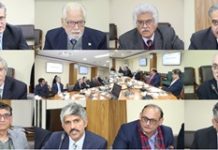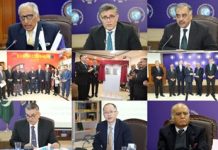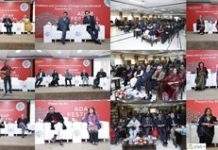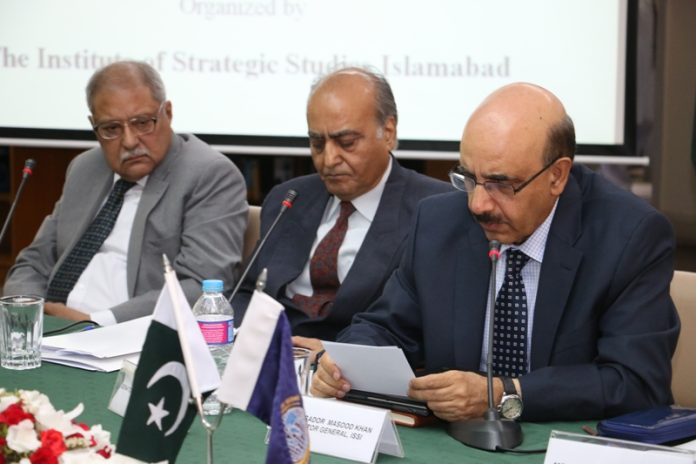Press Release
Book Launch
“Secrets of the Kashmir Valley”
May 30, 2016
The Institute of Strategic Studies, Islamabad (ISSI) organised a book launch of “Secrets of the Kashmir Valley” by Farhana Qazi on May 30, 2016. The Chief Guest at the launch was Senator Lt. Gen. (Retd) Abdul Qayyum. The event was also addressed by a number of distinguished speakers and participants including Ms. Farzana Yaqoob, Minister of Social Welfare and Women Development, Government of AJK; Ambassador Arif Kamal, Director, Global Studies, ISSRA, NDU; and Ms. Mushaal Hussein Mullick, Chairperson, Peace and Cultural Organisation (PCO), Mr. Ghulam Muhammad Safi, Convenor All Parties Hurriyat Conference (APHC), Shamim Shawl Gen Secretary Kashmir Tehreek-e-Khawateen, Dr. Amineh Ahmed Hoti Executive Director of Markaz-e-Ilm, the Centre for Dialogue & Action (CD&A), Ahmed Quraishi, Executive Director, Youth Forum for Kashmir, Shaista Safi, Manager Programmes, Youth Forum for Kashmir, Tahir Mehmood, Program Coordinator of MUSLIM Institute and Tooba Khurshid, Research Fellow, ISSI.
In his welcome remarks, Ambassador Masood Khan, Director General, (ISSI), thanked Ms. Farhana Qazi for choosing the ISSI platform to launch her book which was published in India. Her basic objective to get this book published from India was to tell the story of Kashmiri women suffering to the Indian as well as American audience. The most significant part in writing of this book is that she not only faced difficulties herself, but also witnessed the problems faced by the Kashmiri women. She witnessed the brutalities and sufferings of Kashmiri people, and also met those involved in the Kashmir struggle. Her book provides a way forward for the Kashmir cause. The struggle of Kashmiri women is historic. Kashmiri women despite sufferings always supported their men. Despite molestations they always supported the cause of freedom and demand of right of self-determination. This cause of freedom is not limited to one generation. The youth of Kashmir has reinstated the freedom movement.
Senator Lt. Gen. (Retd) Abdul Qayyum lauded the efforts of Farzana Qazi and said it is an intellectual endeavour which focuses on sufferings in Kashmir. He regretted that the Kashmir dispute has been made a geographical dispute rather than a humanitarian issue. He highlighted the fact that even Indian Prime Minister Nehru always honoured and supported the right of self- determination of the people of Jammu and Kashmir. He also highlighted the fact that the people of Kashmir have been victimised through various black laws effective in Kashmir today. Today ‘shoot to kill’ policy is officially prevalent in Indian occupied Kashmir. He highlighted that since the inception of Pakistan in 1947, all its foreign policies have focused on developing friendly relations with all the countries of the world. It will never have aggressive designs towards any other country and would respect the UN Charter profoundly and work for the international peace from the forefront. Senator Qayyum said that while referring to the Kashmir issue, Muhammad Ali Jinnah had said that we will be supporting the cause of self-determination for all the oppressed and suppressed nations of the world, whether it is Kashmir or Palestine, whether it is Muslim or non-Muslim.
Farhana Qazi said that her aim to write this book was to give a face to the faceless and highlight the pain and sufferings of the Kashmiri women to the world. She said that Kashmir has always been defined in geopolitical framework; however, this book focuses on the collective effort of Kashmiris. She said that despite trauma and suffering there is hope in Kashmiri youth. She made three broad observations that came out of her book: one, women are resilient; two, American involvement in Kashmir is irrelevant; and three, there is a huge demographic change taking place in Kashmir, particularly in terms of the youth bulge and secret societies. She cherished the fact that Kashmiris are able to speak for themselves and their voices will be heard.
Ms. Farzana Yaqoob, Minister of Social Welfare and Women Development, Government of Azad Jammu and Kashmir, said that it is always propagated by India that Pakistan’s internal and external challenges always prevent Pakistan from focusing on the Kashmir dispute. However, despite the false Indian claims, there are people in Indian society like Arundhati Roy, who support the Kashmiri struggle and highlight the suffering of Kashmiri women. For people of Jammu and Kashmir, women’s molestation and sufferings are always significant. India always claims that the Kashmiri narrative is divided, but Kashmiris always demand the right of self-determination. Ms. Farzana Qazi asserted that the Kashmiris will continue this struggle till they succeed and they will succeed because the Kashmiri youth have reinstated this movement.
Ambassador Arif Kamal said that the book describes the oral history of women from 2007-2014. He appreciated the efforts made by the author in presenting the resilience and resolve of the Kashmiris through her book. He highlighted how brilliantly she managed to skillfully portray both the beauty and trauma that co-exist in Kashmir. He said that despite societal fragmentation, she underlined the strong bonds that exiss among the people of Kashmir.
Ms. Mushaal Hussein spoke about how the author has taken empirical evidence and this is very hard to find these days as part of mainstream discussions. The collection of the various case studies of Kashmiri women highlights the yawning gap between the UN resolutions and the abuse faced by these women. It aims to fill in the academic gap that exists through its informative chapters and provides foundational data on the victimisation of Kashmiri women and the issues the world has long been trying to ignore. She concluded by saying that the ideas of liberty and freedom that have been sown in Kashmir for decades will sprout one day and result in a bright future for generations to come.
All the participants lauded the efforts of Farhana Qazi in highlighting the problems faced by the Kashmiri through her writings and suggested that the detrimental conditions that prevail in Indian Occupied Kashmir (IOK) need to be highlighted more frequently and proactively. Ms. Qazi’s interaction with mothers, wives of martyrs, prisoners, protestors and political activists presents a missing history of suffering and struggle of the Kashmiri women. This issue must be given its due importance.
Ambassador Masood Khan, DG ISSI, in his concluding remarks said that the Kashmir struggle is inter-generational. Men and women are making joint efforts in the freedom movement. He suggested that American women and citizen involvement should increase in the struggle of Kashmir. There are many gaps in our policies and we have not been able to bridge them. This is the cause of defending humanity; hence, we need to project our efforts more proactively. The Kashmiris cannot be overwhelmed through coercion, but they can be won over by the maintaining moral high ground.
Tooba K./Arhama S/30052016












